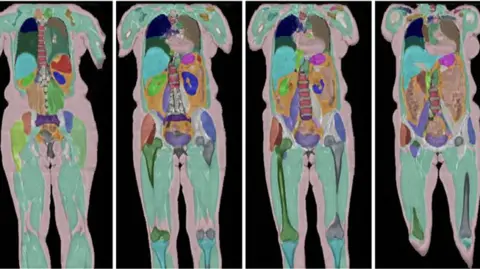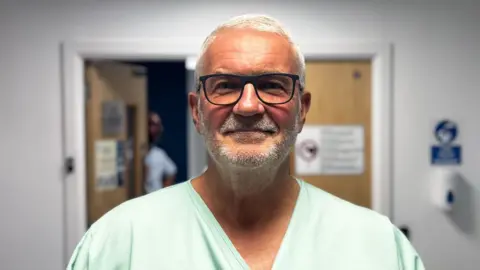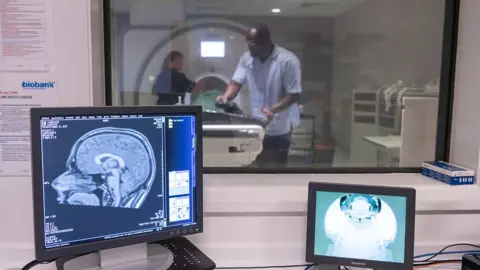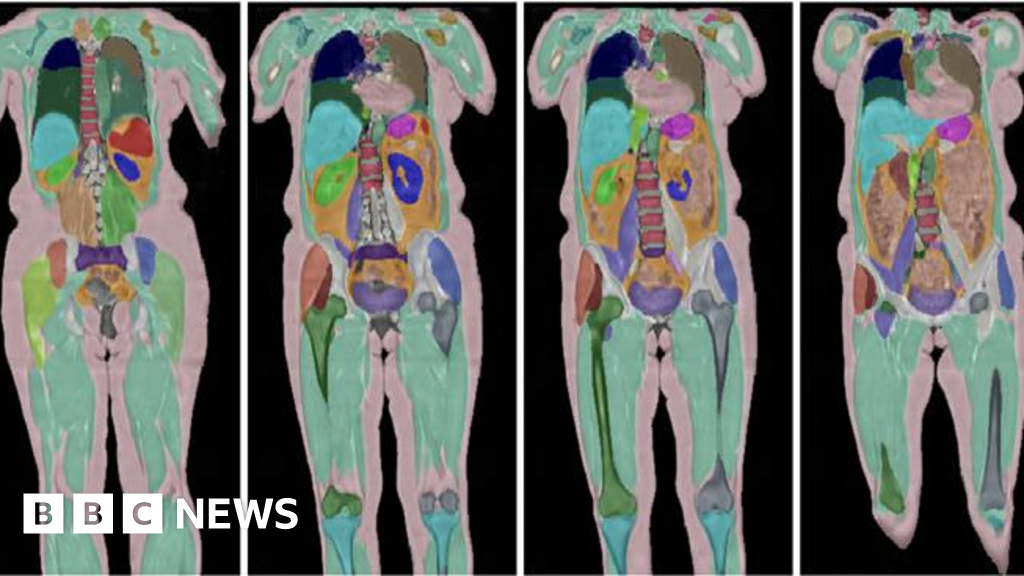 Bourigault et al. 2024
Bourigault et al. 2024Scientists say they can study our bodies as we age in greater detail than ever before, thanks to more than a billion scans of UK volunteers.
The world’s biggest human imaging project says it has now hit its target of scanning the brains, hearts and other organs of 100,000 people – the culmination of an ambitious 11-year study.
“Researchers are already starting to use the imaging data, along with other data we have, to identify disease early and then target treatment at an earlier stage,” says Prof Naomi Allen, chief scientist at UK Biobank.
The data is made available at low cost to teams around the world to find new ways of preventing common health conditions from heart disease to cancer.
The 100,000th volunteer to be scanned was Steve, who recently retired from a job in sales and now helps out at a charity run by his daughter.
The BBC watched as he entered a full-body MRI scanner in an industrial park outside Reading, and detailed images of brain cells, blood vessels, bones and joints appeared on the screens.
“My mum was diagnosed with early-stage dementia a few years ago and has not been well,” he says.
“So with that in mind I want to give more back to research so the next generation can learn from people like me.”

The giant medical imaging project has been running for 13 hours a day, seven-days-a-week across four sites in England.
Participants are given a five-hour appointment to be scanned using five different types of MRI, X-ray and ultrasound machines.
The data gathered is anonymised and volunteers like Steve receive no individual feedback unless the radiographers happen to spot a potentially serious health problem.
The project does not allow personal data, such as a volunteer’s surname or the precise area where they live, to be published.
What is UK Biobank?
 UK Biobank / Dave Guttridge
UK Biobank / Dave GuttridgeLaunched in 2003, UK Biobank is one of the largest collections of biological samples and health data in the world.
In total, half a million people – all middle-aged volunteers – have been asked to complete physical tests, answer regular health and lifestyle questions, and provide DNA and other biological samples.
Their blood, urine and saliva are frozen in liquid nitrogen and stored at temperatures of -80C (-112F) in huge refrigerators in Stockport, Greater Manchester.
The imaging part of the project began in 2014, and involves taking detailed scans of 100,000 of those same participants.
All of that group will be invited back to repeat the process every few years to see how their bodies and organs change as they grow older.
By combining those scans with the other data collected by UK Biobank, scientists can test whether early changes to the make-up of the brain or body then lead to diseases or other health problems in later life.
The whole UK Biobank project, which is non-profit making, was set up by the Medical Research Council (MRC) and the Wellcome Trust charity, along with the Department of Health and the Scottish government.
Two decades later it is now reaching maturity.
Over 30 petabytes, or 30,000 terabytes, of anonymised health data is already available to researchers working for universities, charities, governments and the private sector.
Scientists in the UK and the rest of the world can apply for access and most are charged between £3,000 and £9,000 to help cover running costs.
Louise Thomas, professor of metabolic imaging at the University of Westminster, says it is “completely transforming” how she and other researchers do their jobs.
“We thought it was a crazy idea, there was absolutely no way anybody could scan this number of people,” she says.
“To analyse these images manually would have taken us thousands of years but now… we can extract all the information automatically, so we can measure everything in the body in a matter of minutes.”
Researchers are increasingly using artificial intelligence (AI) to process the huge amounts of data generated by the project.
Almost 17,000 peer-reviewed papers have been written using all types of Biobank data since work started in 2003, with dozens more now published every week.
The scans and images taken so far have already been used to show that:
UK Biobank is one of the 10 largest stores of personal health data in the world alongside similar initiatives in Germany, China and the United States, although those projects don’t all make their data available to scientists globally in the same way.
The imaging element of the project is funded by the MRC, the Wellcome Trust and the British Heart Foundation.
Extra backing for repeat scans is paid for by Calico, a subsidiary of Alphabet which also owns Google, and the Chan Zuckerberg Initiative, established by Facebook founder Mark Zuckerberg and his wife Priscilla Chan.

Get our flagship newsletter with all the headlines you need to start the day. Sign up here.



